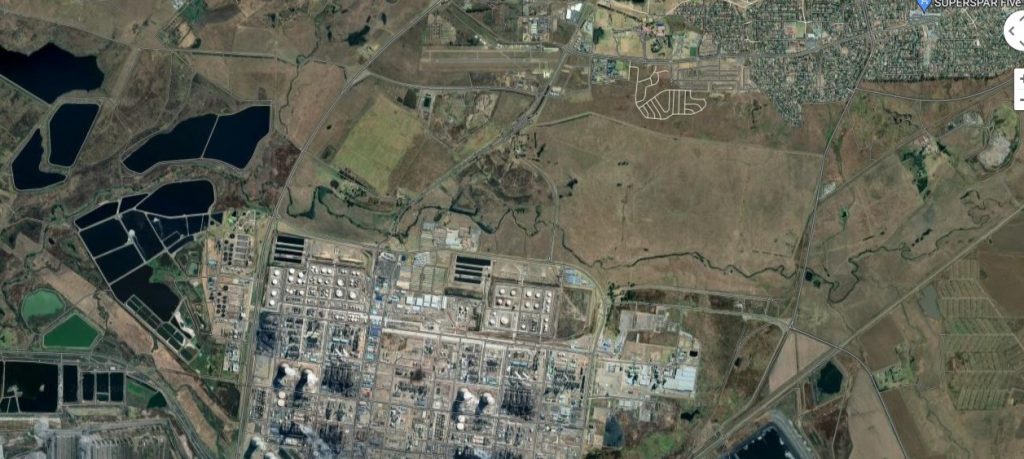
The Klipspruit were contaminated at the end of January and dead fish were observed in the stream near Sasol Operations (SO)
An incident was reported by Sasol on January 31, 2022 when dead fish were observed in the Klipspruit.
This incident’s Actual Severity Classification was set at moderate with a potential severity level as significant.
The possible cause listed on the internal document that was shown to the Bulletin stated that the Equipment/product involved was “Contaminated stormwater released into the environment.
The water quality measurements at Receiving Environment Surface Monitoring station 7 (RESM7) indicated elevated concentrations compared to the limits as stipulated in the Water Use Licence for the Klipspruit.
The Bulletin was unable to establish the exact location of RESM7.

The Bulletin contacted Sasol for an official response.
This is Sasol’s response (placed verbatim)
Aquatic incident at the Sasol Secunda Operations facility
Secunda, Mpumalanga – On 31 January 2022, during routine monitoring of the Klipspruit by the Sasol Secunda Operations (“SO”), dead fish were noticed at the receiving environment surface monitoring station seven (RESM-7). Monitoring of the Klipspruit, Trichardtspruit and Kleinspruit is regularly conducted to monitor any possible impacts from Secunda Operations (SO) on these water resources. During the monitoring, it was also observed that raw sewage from an upstream pump station, unrelated to Secunda Operations or Sasol, entered the Klipspruit upstream of RESM-7. A comprehensive inspection was subsequently done on RESM-7. The aquatic impact was determined to be local and did not impact beyond the Sasol Secunda Complex.
Given the nature of the incident, as a precautionary measure, Sasol Secunda Operations opted to manage the observed dead fish as an incident and reported same to the Department of Water and Sanitation and the Department of Fisheries, Forestry and the Environment in accordance with applicable statutory requirements and within the associated timelines. Initial communications occurred on the same day that the dead fish was observed.
The incident was reported and is still managed on the premise that there was, at the time, and still is no conclusive evidence on the relatedness between SO’s activities and the observed dead fish.
Intermittent controlled releases of process water and storm water occurred at Secunda Operations before (approximately 8 hours) the dead fish was observed. These are governed in terms of a directive received from the DWS. In this regard we wish to point out that no dead fish or other aquatic impacts were observed when subsequent controlled releases occurred.
Also read: Mclaren Circus issued warning by CoGH SPCA
The above controlled releases support a key safety control, necessitated as an urgent measure to manage water levels in process water dams due to the unusually high rainfall experienced in the early part of the rain season (latter part of 2021 and early in 2022).
Managing the water levels within the design capacity of the process water dams is critical to maintain the integrity of the infrastructure in order to mitigate against a dam wall failure and potential consequential environmental catastrophe.
The storm water in question is assumed to be contaminated since it includes run-off water from within the plant area of Sasol Secunda Operations.
An incident investigation, including an aquatic impact assessment and additional specialists studies, related to this incident is being finalised. It will inform the need for and specifics of any additional preventative measures to be implemented by Secunda Operations in respect of the above-mentioned controlled releases in addition to complying with the conditions of the DWS directive.
No similar incidents have occurred in the past five years.
Sasol remains committed to the safety of its employees, the community and environment.
Sasol recently came under fire from the courts regarding Air pollution when the High Court ordered a clampdown on polluters.
Businesstech wrote the following about the court ruling:
A South African court ordered the government to take measures to improve the air quality in a key industrial zone, saying it had breached the constitution by failing to crack down on pollution emitted by power plants operated by Eskom Holdings SOC Ltd and refineries owned by Sasol Ltd.
Environmental Affairs Minister Barbara Creecy had a legal obligation to prescribe rules to implement and enforce anti-pollution regulations and had unreasonably delayed in doing so, High Court Judge Colleen Collis said in a ruling handed down in Pretoria, the capital, on Friday (18 March 2022).
She ordered the matter to be addressed within 12 months and that the new rules provide for penalties for non-compliance and adequate monitoring.
The so-called Deadly Air case, filed in the court in 2019 by groundwork, an environmental-rights organization, and the Vukani Environmental Justice Movement in Action was seen as a key test of the country’s resolve to deal with some of the world’s worst air pollution.
The so-called Highveld Priority Area, which includes much of north-eastern Mpumalanga province and part of the central Gauteng region, is the site of 12 coal-fired Eskom power plants, and an oil refinery and coal-to-fuel plant owned by Sasol.
A Greenpeace study conducted in 2018 showed Mpumalanga had the worst nitrogen-dioxide emissions from power plants of any area globally.
Read the full article HERE